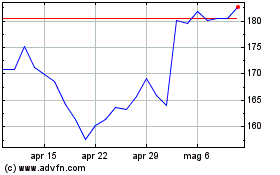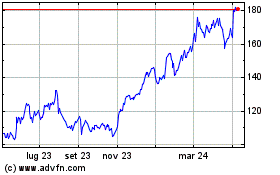By Brent Kendall and Asa Fitch
SAN FRANCISCO -- A federal appeals court appeared receptive to
Qualcomm Inc.'s appeal of a ruling that found it was illegally
maintaining a monopoly in cellphone chips and extracting
unreasonably high royalty rates for patents that are essential to
the industry.
A three-judge panel of the Ninth U.S. Circuit Court of Appeals
repeatedly questioned arguments by the Federal Trade Commission,
which sued Qualcomm in 2017 for alleged antitrust violations.
Near the end of the hourlong hearing Thursday, Judge Consuelo
Callahan suggested Qualcomm's practices had been "overly
capitalistic but not necessarily anticompetitive." She also voiced
skepticism of FTC arguments that Qualcomm's tactics had unlawfully
raised costs incurred by its chip rivals.
Judges on the panel said that, even if the evidence showed that
Qualcomm charged high royalty rates for its patents, that wasn't
necessarily evidence that the company had stifled the competitive
process.
"Anticompetitive behavior is illegal under the Sherman Act.
Hypercompetitive behavior is not," said Judge Stephen J. Murphy, a
visiting judge from Michigan. "This case asks us to draw the line
between the two."
The case cuts to the heart of Qualcomm's business model and
promises broad stakes for two areas of the law that are often in
tension -- antitrust, which is designed to promote competition, and
patent law, which gives intellectual-property owners the right to
exclude competitors from using their inventions unless they pay
licensing fees.
The litigation also comes with an unusual twist: Two different
government agencies that enforce U.S. antitrust laws disagree on
whether Qualcomm's conduct is unlawful and argued against one
another Thursday.
San Diego-based Qualcomm designs and markets chips that
facilitate cellphones' communications with cell towers. It owned
about 43% of the global market for such chips, according to a
Strategy Analytics report from last year's second quarter.
The company also has a licensing arm that collects royalties
when others use a portfolio of more than 140,000 patents
world-wide, many of which cover key telecommunications
technologies. Licensing revenues are only a fraction of chip sales,
but the division is a driver of Qualcomm's overall profits because
its margins are much better.
The Federal Trade Commission sued Qualcomm in the final days of
Democratic control under the Obama administration. It focused on a
central Qualcomm business policy that FTC lawyers described as "no
license, no chips."
The FTC said Qualcomm enjoyed monopolies in two types of modem
chips and wouldn't sell those must-have chips to device makers
unless those companies also paid to license a broader portfolio of
Qualcomm's patents. That structure made it difficult for phone
makers to challenge Qualcomm's royalty rates, and the arrangement
also meant those manufacturers were paying Qualcomm royalties even
if they used a competitor's chips in their phones, FTC lawyer Brian
Fletcher told the panel.
Judges indicated they weren't convinced.
"Is that the standard, making it more difficult for
competitors?" asked Judge Johnnie Rawlinson. "Because that's the
nature of business, to make it more difficult for your competitors
to operate."
"If you're making it hard for competitors because you have a
better product or you sell it for less, no problem," Mr. Fletcher
responded. "That's not this case."
Apple Inc. sued on similar grounds, but the iPhone maker and
Qualcomm settled their differences in April last year, dropping all
litigation and reaching a new chip-supply agreement.
U.S. District Judge Lucy Koh in San Jose, Calif., ruled against
Qualcomm last May. She agreed the chip designer improperly
leveraged its market dominance and ordered Qualcomm to change the
way it does business. If her ruling holds, Qualcomm would be forced
to renegotiate existing patent licenses without taking into account
chip-supply deals, which could dramatically lower licensing
revenues.
Even before Thursday's hearing, the Ninth Circuit already had
stayed the effect of that ruling for now.
The court, both in its stay order and during the hearing,
suggested Judge Koh was on shaky ground in at least part of her
ruling, when she found that Qualcomm had obligations to license
certain industry-essential patents to rivals.
Qualcomm says it acquired its market position through ingenuity
and business acumen, and argues that its licensing practices make
sense because every cellphone invariably uses its patented
technologies.
Qualcomm's lawyer, Thomas Goldstein, said the company invested
$60 billion in a vibrant industry, on the prospect that it would be
able to collect royalties and realize financial success.
Mr. Goldstein didn't dispute that the company had monopoly power
in communications chips, but argued it hadn't used that power to
freeze out competitors. "What has gone wrong in the competitive
process? The answer to that question is nothing," he said.
The company has gained a powerful ally in the past year: the
Justice Department, which argued in defense of Qualcomm at
Thursday's hearing.
The department has said Judge Koh made fundamental errors and
imposed harsh penalties that could hurt innovation and impair a
company that is critical to maintaining the U.S.'s technology
advantage over global rivals.
Qualcomm is a leading U.S. purveyor of superfast
fifth-generation cellular technology, and the U.S. sees the
company's health as crucial to maintaining a 5G advantage over
China, which is rapidly deploying the networks.
A decision is expected in the coming months.
Write to Brent Kendall at brent.kendall@wsj.com and Asa Fitch at
asa.fitch@wsj.com
(END) Dow Jones Newswires
February 13, 2020 16:45 ET (21:45 GMT)
Copyright (c) 2020 Dow Jones & Company, Inc.
Grafico Azioni QUALCOMM (NASDAQ:QCOM)
Storico
Da Mar 2024 a Apr 2024

Grafico Azioni QUALCOMM (NASDAQ:QCOM)
Storico
Da Apr 2023 a Apr 2024
